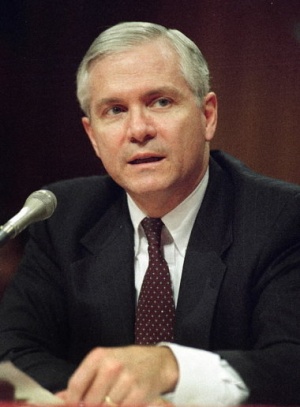Robert Gates
Jump to navigation
Jump to search
(spook) | |||||||||||||||||||||||||||||||||||||||||||||||||||||||||||||
|---|---|---|---|---|---|---|---|---|---|---|---|---|---|---|---|---|---|---|---|---|---|---|---|---|---|---|---|---|---|---|---|---|---|---|---|---|---|---|---|---|---|---|---|---|---|---|---|---|---|---|---|---|---|---|---|---|---|---|---|---|---|
 | |||||||||||||||||||||||||||||||||||||||||||||||||||||||||||||
| Born | Robert Michael Gates 1943-09-25 Wichita, Kansas | ||||||||||||||||||||||||||||||||||||||||||||||||||||||||||||
| Alma mater | Indiana University, Georgetown University | ||||||||||||||||||||||||||||||||||||||||||||||||||||||||||||
| Spouse | Becky Gates | ||||||||||||||||||||||||||||||||||||||||||||||||||||||||||||
| Member of | Atlantic Council/Board, Atlantic Council/Distinguished Leadership Awards, Council on Foreign Relations/Members, JP Morgan Chase/International Council, Paley Media Council | ||||||||||||||||||||||||||||||||||||||||||||||||||||||||||||
| Party | Republican | ||||||||||||||||||||||||||||||||||||||||||||||||||||||||||||
| |||||||||||||||||||||||||||||||||||||||||||||||||||||||||||||
Robert Gates is a US spook who has held various jobs including US Secretary of Defense, Director of Central Intelligence, Chairman of the National Intelligence Council.
Career
Robert Gates became Deputy director of the CIA.
Pollard case
"Robert Gates told me that Casey had never indicated to him that he had specific information about the Pollard material arriving in Moscow. "The notion that the Russians may have gotten some of the stuff has always been a viewpoint," Gates said, but not through the bartering of emigres. "The only view I heard expressed was that it was through intelligence operations" — the K.G.B."[1]
Realist faction leader
Jim Lobe argued that Gates was the leader of a realist faction in the Bush administration, rivalling the neoconservatives.
- The realist resurgence can also be traced to the rise of specific individuals, who took the place of their discredited predecessors in posts between the beginning of Bush's second term and the end of 2006 when the most important realist of all – Defense Secretary Robert Gates – replaced Donald Rumsfeld at the Pentagon.
- With Gates heading Washington's most-powerful foreign-policy bureaucracy, the return to realism, which was already underway – albeit tentatively – as early as 2004, accelerated sharply. By the end of 2007, the administration's top hawk, Vice President Dick Cheney, looks more isolated than ever.[2]
Events Participated in
| Event | Start | End | Location(s) | Description |
|---|---|---|---|---|
| Colloquium on Intelligence Requirements for the 1990s | 4 December 1987 | 5 December 1987 | Spooky 1987 conference | |
| Colloquium on Intelligence and Policy | 9 November 1984 | 10 November 1984 | A spooky conference in November 1984 | |
| Halifax International Security Forum/2009 | 20 November 2009 | 22 November 2009 | Canada Halifax Nova Scotia | Spooky conference in Canada in November 2009 |
Many thanks to our Patrons who cover ~2/3 of our hosting bill. Please join them if you can.
References
- ↑ The Traitor: The Case against Jonathan Pollard, by Seymour Hersh, The New Yorker, 18 January 1999, via JYA.
- ↑ Gates Led Realist Resurgence in 2007, by Jim Lobe, Antiwar.com, 28 December 2007.